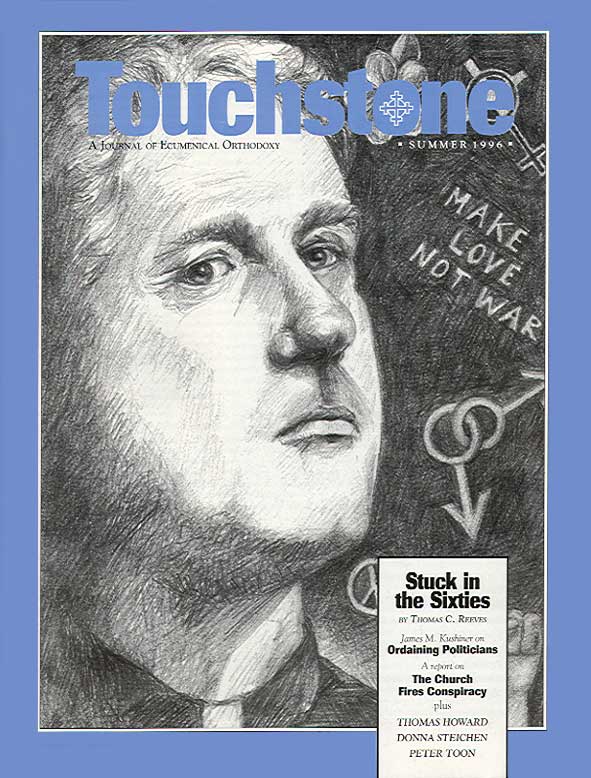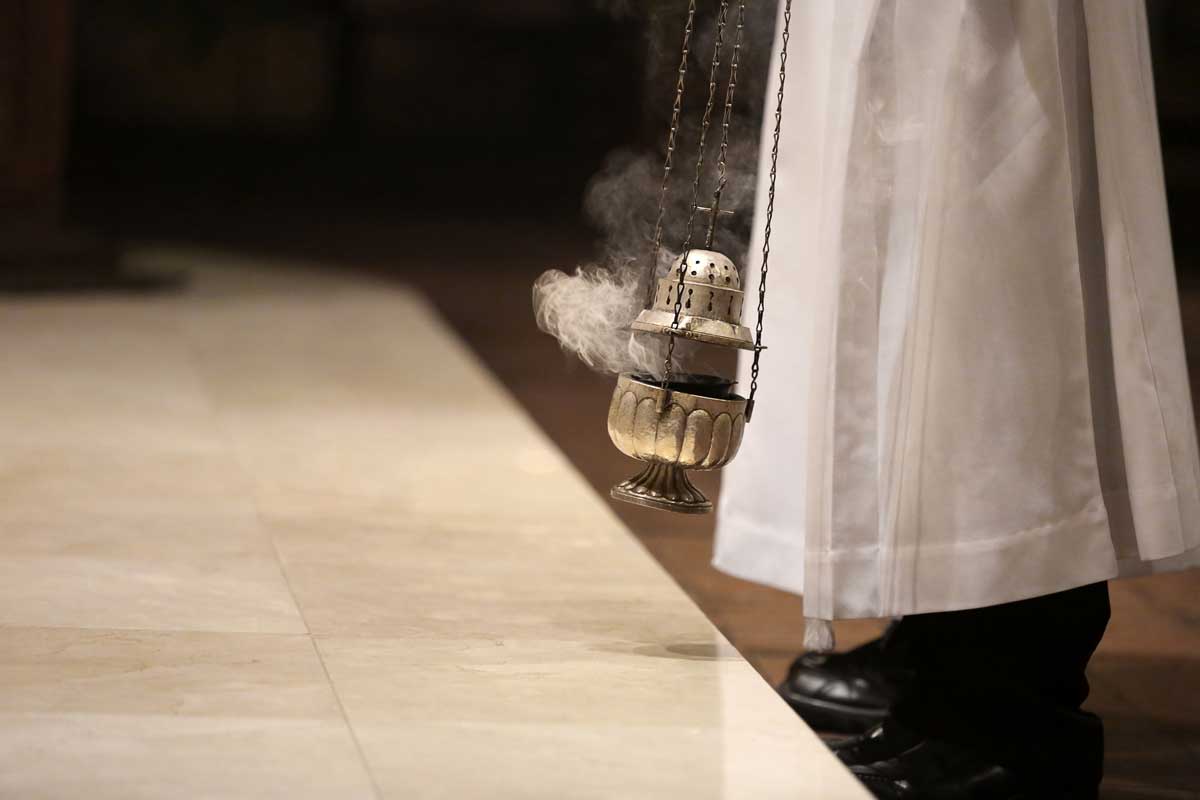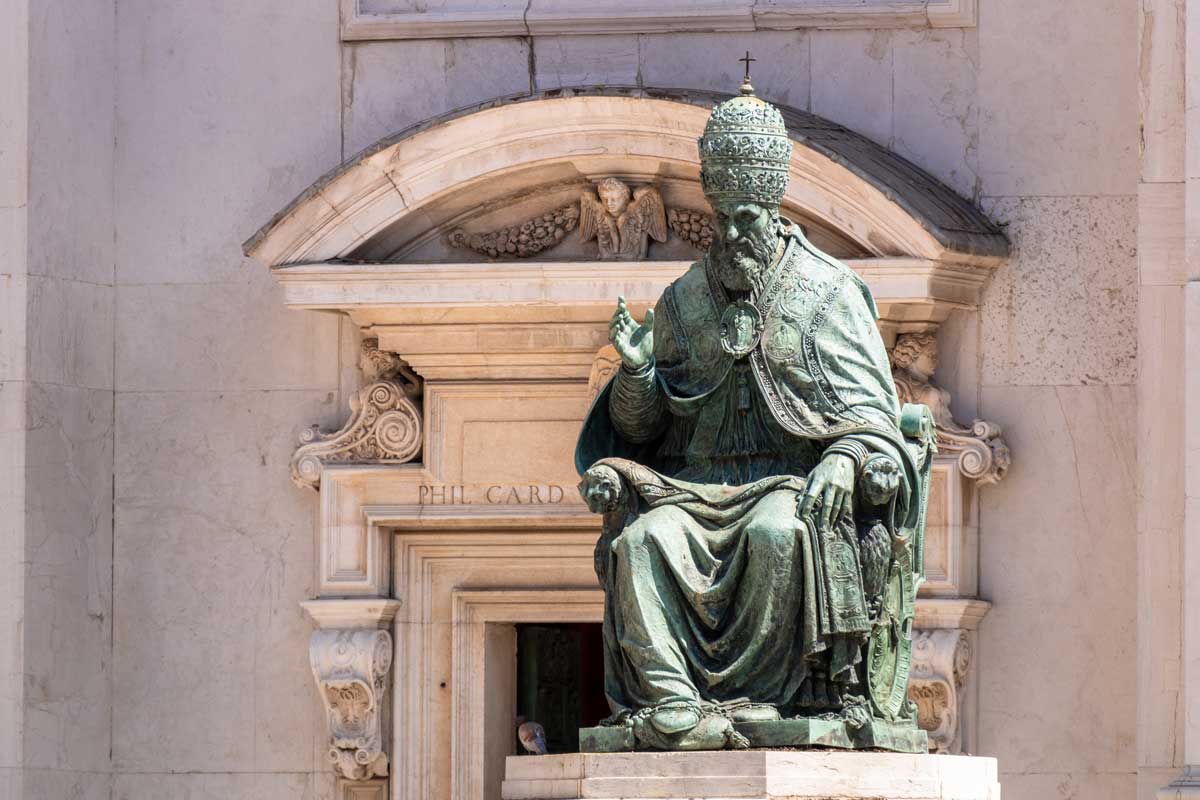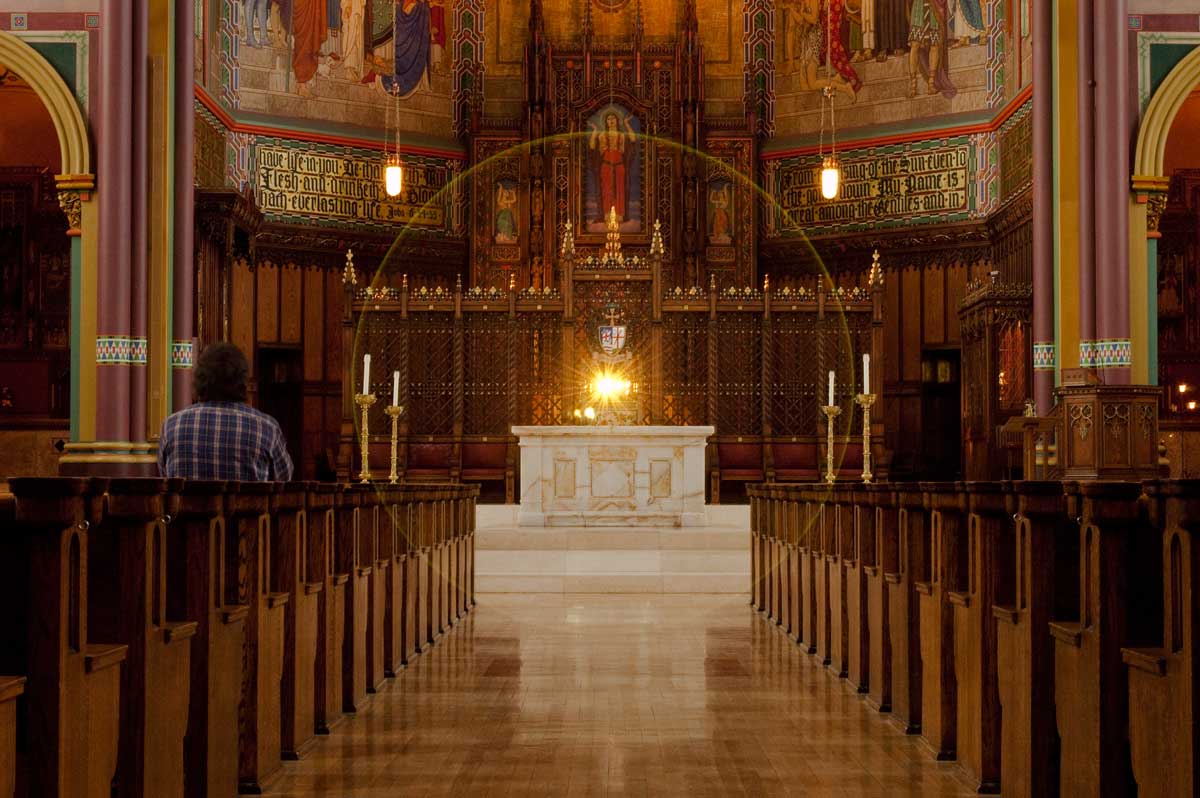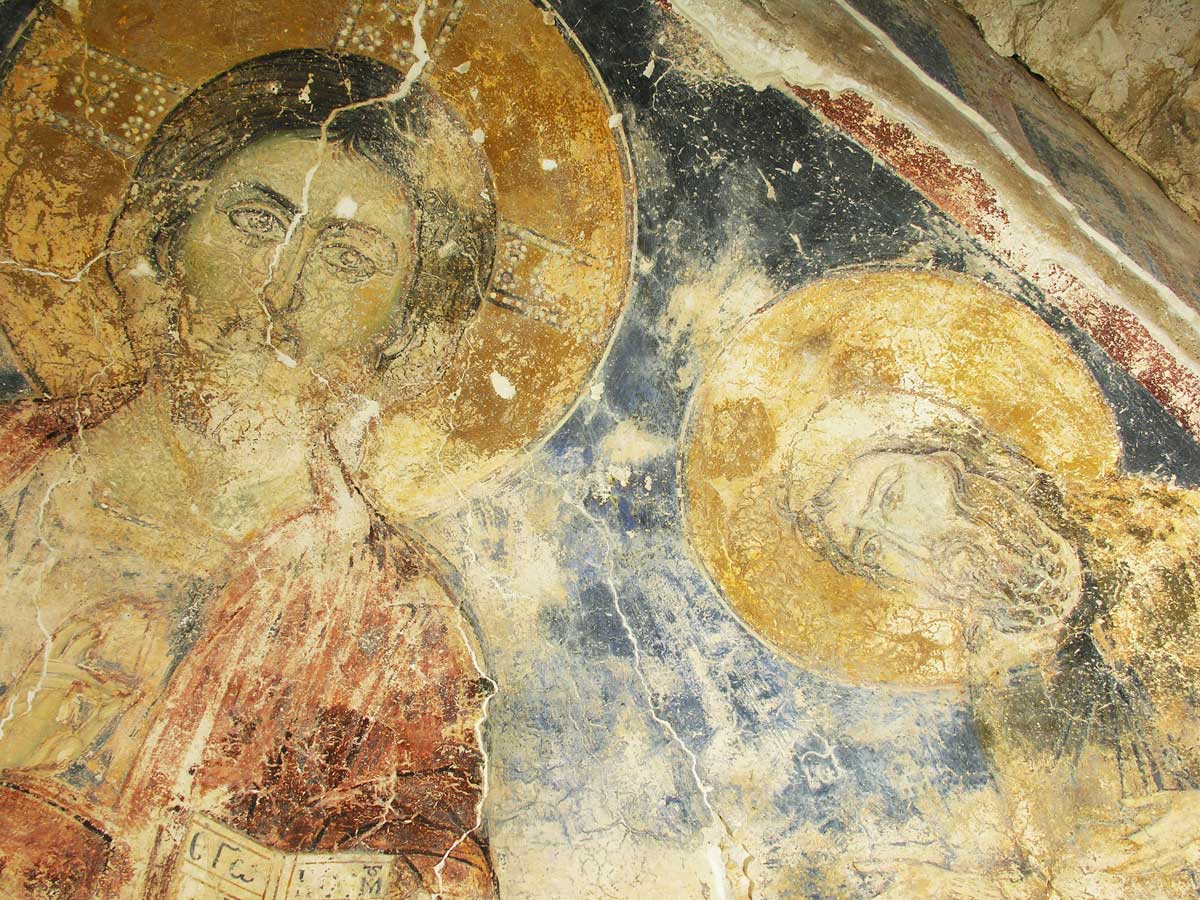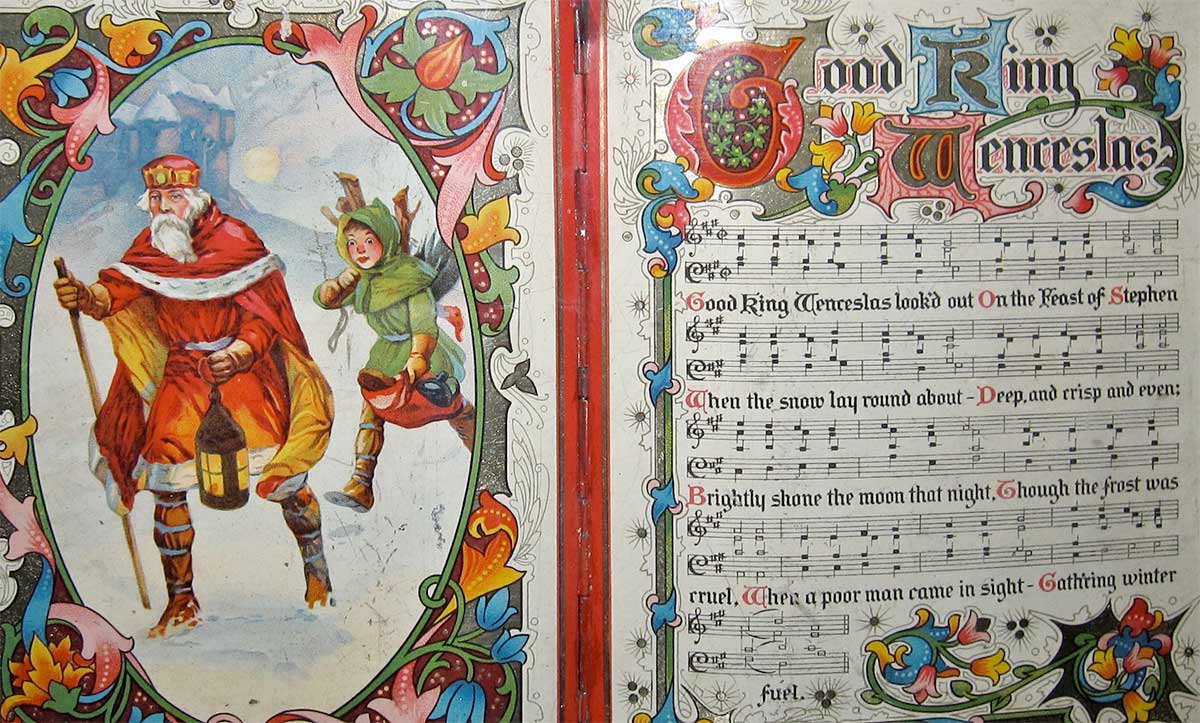Feature
Brideshead Revisited Revisited
Moral Imagination & the Catholic Faith in Evelyn Waugh’s Modern Novel
The late Russell Kirk spoke often of “the moral imagination.” By it he referred to that whole backdrop, or set of underpinnings, that corroborates for us mortals the fixities of the moral law. We are not angels: hence we do not encounter Reality directly. We are protected (“from heaven and damnation,” says Eliot) by the merciful arch, or filter, we might say, of the temporal and spatial, which bring with them the forms and colors that address our imaginations.
When we use this phrase, moral imagination, we do not mean that the moral world exists only in the realm of fancy. Rather we refer to the vision of good and evil that we find in works of fiction. It is a vision that not only suffuses these works, but also presides over the terms of these fictions, nay, that determines the very stuff and texture of them.
Take, for example, the fourteenth-century Vision of William Concerning Piers the Plowman: here we have, in an allegory to be sure, not merely the picture of a personality, or of a whole world, but, beyond these, the vision of what constitutes goodness and badness. Or take Gawain: the trouble in that poem is that Gawain has sinned (not that he is “out of touch with his feelings,” or that he has been “victimized”). There is a moral litmus test brought to bear on his behavior. In The Faerie Queene, all the thick woods and grottoes and hags and perils are to be understood in moral, and not merely psychological, or linguistic, terms. In Measure for Measure, the thing that has them all apoplectic in Vienna is the matter of sin and its punishment. We playgoers may enjoy the leisure and luxury of beholding fascinating personalities at work—Isabella and Angelo and Lucio and Claudio—but the nub of the drama is a moral matter.
The Waning of Moral Imagination
It is not without significance that we often reach for Renaissance and pre-Renaissance fiction when we speak of the moral imagination. By the time we get to Fielding, and then Jane Austen, Trollope, Henry James, and Virginia Woolf, we are not sure that “moral” is altogether the apt word. To be sure, all of these authors undergird their stories, in some sense, with a world of moral suppositions. Trollope, for example, shows how all the dramatic currents and countercurrents flow over a bed, so to speak, of moral assumptions. The sanctity of marriage is there, for example, and truthfulness, and generosity, and fidelity to one’s duties, and benevolence: it is all there. But the main thing that engages our attention in Barset, or among the Pallisers, is not a rock-bottom question about goodness and evil; Trollope has not set out primarily to extol morality or religious truth.
Walker Percy makes this distinction, speaking of fiction:
Let me define the sort of novelist I have in mind. . . . He is . . . a writer who has an explicit and ultimate concern with the nature of man and the nature of reality. . . . One might apply to the novelist such adjectives as “philosophical,” “metaphysical,” “prophetic,” “eschatological,” and even “religious.”. . . Such a class might include writers as diverse as Dostoevsky, Tolstoy, Camus, Sartre, Faulkner, Flannery O’Connor. Sartre, one might object, is an atheist. He is, but his atheism is “religious” in the sense intended here: that the novelist betrays a passionate conviction about man’s nature, the world, and man’s obligation in the world. By the same token, I would exclude much of the English novel—without prejudice: I am quite willing to believe that Jane Austen and Samuel Richardson are better novelists than Sartre and O’Connor. The 19th century Russian novelists were haunted by God; many of the French existentialists are haunted by his absence. The English novelist is not much interested one way or another. The English novel traditionally takes place in a society as every one sees it and takes it for granted. If there are vicars and churches prominent in the society, there will be vicars and churches in the novel. If not, not. So much for vicars and churches. ( The Message in the Bottle. New York. 1982. p. 103).
Waugh Steals a March
It is not to be urged that Evelyn Waugh should be thought the equal of Tolstoy, or even of Jane Austen. Nevertheless, his fiction raises piquant questions, if we are speaking of the moral imagination and twentieth-century English language fiction—particularly Brideshead Revisited. But his Sword of Honor trilogy also would certainly raise similar questions, most notably in the figure of the protagonist’s father, old Gervase Crouchback. We would need to undertake a wide canvass in order to discover another character in recent fiction who exhibits in such stark colors the quality that we can only call holiness. We, jades that we moderns are, find ourselves hailed, against all plausibility, with holiness—that is the only word for it—in the figure of Gervase Crouchback. And it is done, mirabile dictu, without the faintest whiff of sentimentality.
But in Brideshead Revisited, Waugh has done the almost unthinkable. He has given us (jades, if the accusation is not too fierce) a full-blown acclamation of Catholic piety, vision, morals, and dogma, but in terms that steal a march past merely modern sensibilities, and in fact virtually swamp those sensibilities.
It might be put this way: we are a skeptical epoch. Waugh’s book is full of skepticism: indeed, the narrator is a card-carrying skeptic. Charles Ryder, the protagonist, is a thoroughly modern man. We might congratulate ourselves on being a somewhat cynical epoch—and the book is redolent of cynicism. Again, we are an unbelieving era, and the whole drama in Brideshead is seen through the lens of unbelief. Yet again, we are most certainly a highly self-conscious era—and the narrator in Brideshead is agonizingly self-conscious, almost paralytically so. (In the BBC television series, Jeremy Irons, in depicting Charles Ryder, displayed incredible dramatic prowess by making the reticent, self-conscious, laconic Charles a figure who seizes and holds our attention, and affection even.)
Oddly, Brideshead would seem able to take its place entirely comfortably on the shelf of modern fiction (as opposed to other fiction which has religious overtones, like that of Tolkien or Williams or Chesterton, for whom categories like “fantasy,” and “metaphysical thriller” have to be invoked). And yet Brideshead takes us all the way in to the world of Christian belief, piety, and dogma.
Upstaging & Disarming
How does Waugh do it? My hunch is that he does it by bravado. It is bravado that is Waugh’s trump card. Knowing that he is writing in a highly blasé, weary, and urbane world (and fifty weary years have passed since then), he first of all trumps that world, so to speak. He upstages us all by making his novel ten times more blasé, weary, and urbane than we are.
For example, the tale is set in the 1920s, in Oxford, London, and Venice, and at a great country house. Any reader ignorant enough to congratulate himself on his own cleverness is very quickly left in the dust by the sheer agility, the prowess, the vivace tempo of the badinage flying about his ears. You thought you were urbane? Meet Sebastian: you will feel yourself an oaf. You thought you were witty? Meet Anthony Blanche: you will retire in confusion from the lists. You thought you had fine sensibilities? Next to Charles you are a churl. You thought you were civilized? In the family circle at Marchmain House you find that you are the merest rustic, left mute by your own solecisms.
But Waugh’s strategy goes much further than this. After upstaging our supposititious urbanity, he goes on to disarm our routine and self-congratulatory unbelief, again by sheer bravado. That is, we find ourselves in thick Catholic piety and faith, but deprived, somehow, of our usual ability to patronize that piety and faith. We have lost our vantage point, and it is no longer these pious people who are under our avuncular surveillance, but we who are under theirs. For example, in one conversation with Lord Brideshead, Charles announces that he is an agnostic. Bridey is only mildly diverted by this, the way he would be if Charles had announced himself a vegetarian or a necrophiliac. “Really?” says Bridey. “Is there much of that at your college? There was a certain amount at Magdalen. . . . It’s everywhere.”(92)
Now that is bravado. But it is not bravado from the characters themselves. Indeed, there is nothing ostentatious, or swashbuckling, about any of them. The bravado is at work in the challenge that the narrative mounts against the reader. We find that we have been angled into the uncomfortable position of being the ones under scrutiny. We no longer have the luxury of patting faith on the head. Faith is looking at us, quizzically, ironically, and slightly incredulously. “An unbeliever?” it seems to say. “Fancy.” Somehow “unbeliever” and “bumpkin” seem to have become synonymous here.
The Catholic Gauntlet
But a much greater subtlety is at work in Waugh’s narrative than any brief exchange like that might suggest. The subtle strategy comes in the form of a challenge: the reader finds himself drawn into the story, and losing thereby his agnostic footing. (This, of course, is to assume, for the argument, that your archetypal “modern” reader is agnostic.) We enter a brilliant world in the story, but it is a peculiar world, namely, the world of the Catholic aristocracy in England. By locating his story here, Waugh throws down a gauntlet.
Catholicism in England always has been in the minority: for some centuries it was a beleaguered minority. So to be Catholic in England was to be entirely free from the burden under which the Church of England always seems to stagger, namely the burden of being agreeable. Anglican bishops seem anxious to assure everyone that what they are retailing is, after all, nothing but good, modern, sensible English fare. Don’t for a moment suppose that I am purveying zeal, or miracles, or revival. To be Anglican is to be au courant.
This is an unfair caricature, of course, but one which, for good or ill, finds itself echoed in English fiction (and also in television: the late Malcolm Muggeridge was wickedly merciless in tweaking the noses of just this sort of churchman).
By locating his story among the English Catholic aristocracy, Waugh has, with one leap, made it immune from having to be acceptable. Catholicism through the centuries has not ordinarily been found pawing the arm of contemporaneity, as it were, and pleading, “But you can be Catholic without crowding your Englishness, or your respectability.” To be Catholic is to be different—but not different, Waugh would have urged, in the way cults, sects, or conventicles are. It is easy to dismiss the religion in those quarters by pointing out that it is tacky, or marginal, or haywire, or arriviste, whereas to be Catholic is to belong to the most ancient and august organism in the world. It is older than the oldest dynasties and universities. To be Catholic is to be free from ever having to temporize. (If this sounds triumphalist, we may remind ourselves that Waugh might not have demurred at the charge.) To be Catholic is to be identified as someone who espouses a whole fabric of ideas—Virgin Birth, miracles, transubstantiation, and so forth—but who cannot be dismissed with exactly the same insouciance with which one might dismiss you if you belonged to a sect.
This matter never comes up in the story in so many words: but the way in which the Flyte family hold their faith is a vastly different business from the way in which, say, a devout evangelical middle-class family might hold theirs. The Flytes are immemorially at home in their serene and lofty faith, and entirely untroubled by the disjuncture between that faith and the rest of England. They have, as it were, nothing to prove.
Narrative Alchemy
Thus Waugh outflanks his readers. He does not have to try to weasel religion into the narrative: it is of the very texture—a highly civilized texture—of the narrative. But there is more. Waugh manages a sort of narrative alchemy, so to speak, whereby the troubles of the Flyte family take on the aspect of sin.
This is unheard-of in modern fiction. Which of Henry James’s or D. H. Lawrence’s or E. M. Forster’s characters must make his agonizing choices in life under the scrutiny of the Church’s teaching on sin (unless it be by shucking off that teaching)? Stephen Dedalus must leave the world of Jesuit sermons. But in Brideshead, we find that everyone, sooner or later, must come to terms with God, not in an attenuated or leeched-out version that might be acceptable to William Ellery Channing’s Boston, or our own New Age sibyls. No. What is asked of the characters is that they squeeze through the needle’s eye of sacramental confession and absolution, and thus find dignity and freedom and authenticity. It offends our fastidiousness.
This tactic, or alchemy, if you will, whereby Waugh obliges us to take seriously the demand laid on his characters that they face their choices in the light of Catholic teaching, is paralleled by another tactic, namely, that even though the Faith is, in some sense, the heroine of the story, nevertheless, every single exemplar of that Faith is a very poor icon.
The Poorest of Icons
We may survey the characters to see if this is so. First, of course, there is Sebastian. What a dazzling, coruscating figure he is. Young, beautiful, witty, acerb, cavalier, infinitely cultivated: which of us is not left plodding in the dust as his barouche-landau whirls by? He seems to know, and be long since at home in, everything that marks the precincts where life is lived with grace and civility: cigars, wine, clothes, art, repartee, persiflage, eccentricity—Sebastian is the very avatar of all of this. He would seem to stand at a polar extreme from the dowdy world of religious belief. But when Charles ventures to raise the matter of Sebastian’s faith, ever so gingerly, we have this:
“Oh dear, it’s very difficult being a Catholic!”
“Does it make much difference to you?”
“Of course. All the time.”
“Well, I can’t say I’ve noticed it. Are you struggling against temptation? You don’t seem much more virtuous than me.”
“I’m very, very much wickeder,” said Sebastian indignantly.
“… I suppose they try to make you believe an awful lot of nonsense?”
“Is it nonsense? I wish it were. It sometimes sounds terribly sensible to me.”
“But my dear Sebastian, you can’t seriously believe it all.”
“Can’t I?”
“I mean about Christmas and the star and the three kings and the ox and the ass.”
“Oh yes. I believe that. It’s a lovely idea.”
“But you can’t believe things because they’re a lovely idea.”
“But I do. That’s how I believe.” (pp. 81–83)
This is the note struck in Brideshead Revisited. Whereas religion ordinarily has to creep apologetically, or lurch awkwardly, onto the stage, here it dances out in front of our eyes, daring us to cavil or carp. We haven’t often encountered religion in these bravura terms. We are not sure how we might gainsay it.
And there is Sebastian’s older brother, Lord Brideshead (Bridey). The satanically witty Anthony Blanche, in his thumbnail sketch of the whole family, says Brideshead is “something archaic, out of a cave that’s been sealed for centuries. He has the face as though an Aztec sculptor had attempted a portrait of Sebastian; he’s a learned bigot, a ceremonious barbarian, a snowbound lama.”(54) And indeed, we find ourselves writhing at times over Brideshead’s lack of apparent tact.
But there is something vastly civilized about Bridey at the same time. He has no vanity at all, and he is transparent and utterly without malice. But he can be heavy-footed. We find this when Bridey explains why his fiancee, Beryl Muspratt, must not visit the Flyte household, where Julia is now present with her husband and Charles, her lover: “You must understand that Beryl is a woman of strict Catholic principle, fortified by the prejudices of the middle class. I couldn’t possibly bring her here. It is a matter of indifference whether you choose to live in sin with Rex or Charles or both—I have always avoided inquiry into the details of your menage—but in no case would Beryl consent to be your guest.” (285)
Confirmed Prejudices
So far, Catholicism is not being very compellingly, or attractively, represented by the Catholics among whom our agnostic narrator Charles finds himself. Sebastian’s Catholicism seems to exist in a category with Mother Goose; and Brideshead sounds like an inquisitor. But there is their wonderful little sister Cordelia. She promises to pray for Charles, and tells him she can’t spare a whole rosary for him, only one decade. She also thinks it would be a good idea if Charles chipped in five shillings so she can buy yet another African goddaughter. “You send five bob to some nuns in Africa and they christen a baby and name her after you. I’ve got six black Cordelias already. Isn’t it lovely.” (94) We seem to be being invited to write Catholicism off with our worst prejudices confirmed about how mercenary and idolatrous it is.
But Cordelia turns out to be a girl, and presently a young woman of vast integrity, generosity of spirit, joy, and self-effacement. Much later in the story, speaking to Charles of the disordered lives of her older brother and sister, Sebastian and Julia, she says, “There’s Sebastian gone and Julia gone. But God won’t let them go for long, you know.” Then she quotes Chesterton’s Father Brown: “ ‘I caught him with an unseen hook and an invisible line which is long enough to let him wander to the ends of the world and still to bring him back with a twitch upon the thread’.” (220) With charity and faith like this at work in Cordelia, we readers scarcely feel inclined to snipe at her five-shilling goddaughters in Africa.
In this same conversation with Charles, she speaks of Lady Marchmain, their mother. Lady Marchmain has died by this late point in the story. Cordelia says to Charles, “You didn’t like her. I sometimes think when people wanted to hate God they hated Mummy… You see, she was saintly, but she wasn’t a saint. No one could really hate a saint, could they? They can’t really hate God either. When they want to hate Him and His saints they have to find something like themselves and pretend it’s God and hate that. I suppose you think that’s all bosh.” (221)
The reader, it seems, has been angled into Charles’s position: do I wish to sit in judgment on such sentiments as these, when the thing that so patently glimmers through it all is goodness?
The Marchmain Enigma
But what are we to make of Lady Marchmain? Early in the story, Charles, the narrator, says this: “Religion predominated in the house; not only in its practices—the daily mass and rosary, morning and evening in the chapel—but in all its intercourse. ‘We must make a Catholic of Charles,’ Lady Marchmain said.” (126) In one conversation with Charles, speaking of the tremendous wealth that their family enjoys, she says this: “Now I realize that it is possible for the rich to sin by coveting the privileges of the poor,” (127), and goes on to point out that paradox is of the essence of the gospel: “It’s not to be expected that an ox and an ass should worship at the crib.” (127)
This is all innocent enough; but we discover in the story that Lady Marchmain is something of a dragon. It may be because of her sheer power over her children, exercised ever so softly and elegantly, that they all have such problems. And so once again, we find a reason why Catholicism need not win us over. Look at what a termagant Catholic piety has made of Lady Marchmain.
But then we come to this, uttered after Lady Marchmain’s death by Julia, through bitter tears of remorse over her own sinful and adulterous life: “Mummy carrying my sin with her to church, bowed under it and the black lace veil, in the chapel; slipping out with it in London before the fires were lit; taking it with her through the empty streets where the milkman’s ponies stood with their forefeet on the pavement; Mummy dying with my sin eating at her, more cruelly than her own deadly illness. Mummy dying with it; Christ dying with it, nailed hand and foot; hanging over the bed in the night-nursery; hanging year after year in the dark little study at Farm Street… hanging in the dark church where only the old charwoman raises the dust and one candle burns; hanging at noon, high among the crowds and the soldiers; no comfort except a sponge of vinegar and the kind words of a thief…” (288)
Julia, Charles & Death
Which brings us to Julia, long since deeply embroiled in a life of sexual havoc. At the end of the story, she renounces Charles, for whom she has divorced her husband: “I can’t marry you, Charles… I saw today that there was one thing unforgivable… the bad thing I was on the point of doing, that I’m not quite bad enough to do; to set up a rival good to God’s. Why should I be allowed to understand that, and not you, Charles? It may be because of Mummy, Nanny, Cordelia, Sebastian—perhaps Bridey and Mrs. Muspratt—keeping my name in their prayers; or it may be a private bargain between me and God, that if I give up this one thing I want so much, however bad I am, He won’t quite despair of me in the end.” (340)
Just a day or two earlier, when the family insists that their father, the renegade Lord Marchmain, be given the last rites on his deathbed and Charles fiercely objects—“Can’t they even let him die in peace?”—Julia replies, “They mean something so different by ‘peace’.” And when Charles objects that extreme unction is “a lot of witchcraft and hypocrisy,” Julia asks, “Is it? Anyway, it’s been going on for nearly two thousand years.” (325, 325)
The scene at Lord Marchmain’s deathbed is one of the most delicate in all of fiction. Waugh’s tact as a narrator is put to the fiery test here. How do you present a drawn-out, highly-charged deathbed scene without sloshing into the worst sort of bathos and treacle? Victorian novels and Hollywood movies have made us all quite justifiably skittish about deathbed scenes.
But Waugh seems to bring this one off. It is doubly threatened with sentimentalism, since not only do we have the dying man surrounded by his family, we also have our agnostic Charles, having reached the crisis in his own recalcitrant itinerary. He has been scandalized, through all the action, with this dogged faith of the family; but now, at Lord Marchmain’s bedside, with the family kneeling and the priest making the sign of the cross over the dying man, we have this: “Then I knelt, too, and prayed: ‘O God, if there is a God, forgive him his sins, if there is such a thing as sin…’ I suddenly felt the longing for a sign, if only of courtesy, if only for the sake of the woman I loved, who knelt in front of me, praying, I knew, for a sign… All over the world, people were on their knees before innumerable crosses, and here the drama was being played again … the universal drama in which there is only one actor… Suddenly Lord Marchmain moved his hand to his forehead… the hand moved slowly down his breast, then to his shoulder, and Lord Marchmain made the sign of the cross. Then I knew that the sign I had asked for was not a little thing, not a passing nod of recognition and a phrase came back to me from my childhood of the veil of the temple being rent from top to bottom.” (338, 339)
The Unseen Hand
How do you do a conversion scene? The perils are legion. But Waugh’s tact is in control: we never see Charles converting. Only in the epilogue, when we are back in the bleak present with Charles, nineteen years later, do we find him, in 1943, with his army unit having been ordered to bivouac, unbeknownst to him, on the immense Brideshead estate. He steps into the little chapel in the house. “There was one part of the house I had not yet visited, and I went there now. The chapel showed no ill-effects of its long neglect; the art-nouveau paint was as fresh and bright as ever; the art-nouveau lamp burned once more before the altar. I said a prayer, an ancient, newly-learned form of words, and left, turning towards the camp… Something quite remote from anything the builders intended had come out of their work, and out of the fierce little human tragedy in which I played; something none of us thought about at the time: a small red flame—a beaten-copper lamp of deplorable design, relit before the beaten-copper doors of a tabernacle; the flame which the old knights saw from their tombs … that flame burns again for other soldiers, far from home… It could not have been lit but for the builders and the tragedians and there I found it this morning, burning anew among the old stones.” (350, 351)
That is language that sails very near the wind. One false word, and we would capsize into sentimentalism. But I think Waugh brings it off. Reticence is what saves it all. We are not given the conversion scene: that would have been unmanageable (we may recall similar reticence on Shakespeare’s part, in refraining from giving us the marriage scene of Romeo and Juliet, and in having Falstaff’s death scene only reported by the maladroit Mistress Quickly). But we do see Captain Charles Ryder, in the chapel, offer an ancient prayer, newly learned. Somebody has been teaching him the prayers of the Church. Obviously he has been received into that ancient Church.
The Heroine of Faith
Brideshead Revisited is the story of a religious conversion, whatever else it may be. Conversion is one of the topics that is most intractable, and most inhospitable to any attempt to come at it narratively. There is one sense in which the Catholic Faith itself may be said to be the heroine of the story. Certainly Charles is the protagonist. But the victor is the Faith that, in spite of—or, paradoxically, and far more profoundly because of—its shabby look when clothed with the flesh of Catholics themselves, triumphs, both in Charles, and also in each of the characters before they make their exits.
Waugh would have urged that this is the way it is. God shows up in the most inauspicious precincts: Israel—not one of the more impressive tribes of antiquity; Bethlehem—not one of the watering spots of the world; Calvary—scarcely an appropriate purlieu for the King of Heaven; the Church—not exactly a select group; and a flat, white, tasteless wafer—not a hopeful entry in the baked-goods sweepstakes. But the thing about all of these items is that God is to be found there.
Waugh has caught this in his novel and consequently offers the modern reader a work of moral imagination rare in modern fiction. The squalor, the bad taste, the stürm und drang, the ineptness, show up, not just in remote contrast to some austere vision of the Faith. They are the very modality in which that Faith is, as often as not, mediated to us.
Thomas Howard taught for many years at St. John's Seminary College, the Roman Catholic seminary of the archdiocese of Boston. Among his many works are the books Christ the Tiger, Evangelical Is Not Enough, Lead Kindly Light, On Being Catholic, and The Secret of New York Revealed, and a videotape series of 13 lectures on "The Treasures of Catholicism" (all from Ignatius Press).
subscription options
Order
Print/Online Subscription

Get six issues (one year) of Touchstone PLUS full online access including pdf downloads for only $39.95. That's only $3.34 per month!
Order
Online Only
Subscription

Get a one-year full-access subscription to the Touchstone online archives for only $19.95. That's only $1.66 per month!
bulk subscriptions
Order Touchstone subscriptions in bulk and save $10 per sub! Each subscription includes 6 issues of Touchstone plus full online access to touchstonemag.com—including archives, videos, and pdf downloads of recent issues for only $29.95 each! Great for churches or study groups.
Transactions will be processed on a secure server.
more on Catholic from the online archives
more from the online archives

11.5—September/October 1998
Speaking the Truths Only the Imagination May Grasp
An Essay on Myth & 'Real Life' by Stratford Caldecott
calling all readers
Please Donate
"There are magazines worth reading but few worth saving . . . Touchstone is just such a magazine."
—Alice von Hildebrand
"Here we do not concede one square millimeter of territory to falsehood, folly, contemporary sentimentality, or fashion. We speak the truth, and let God be our judge. . . . Touchstone is the one committedly Christian conservative journal."
—Anthony Esolen, Touchstone senior editor





